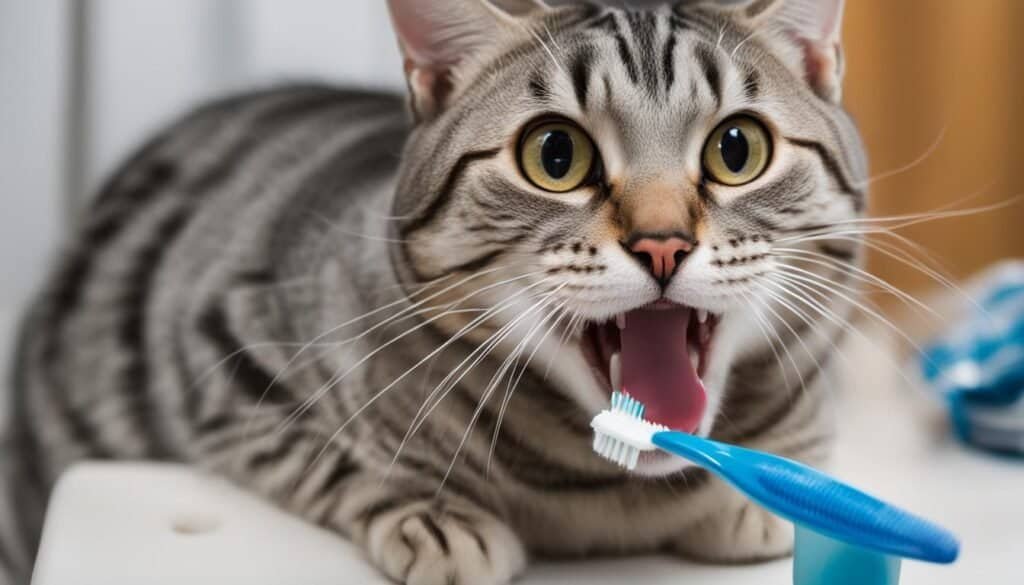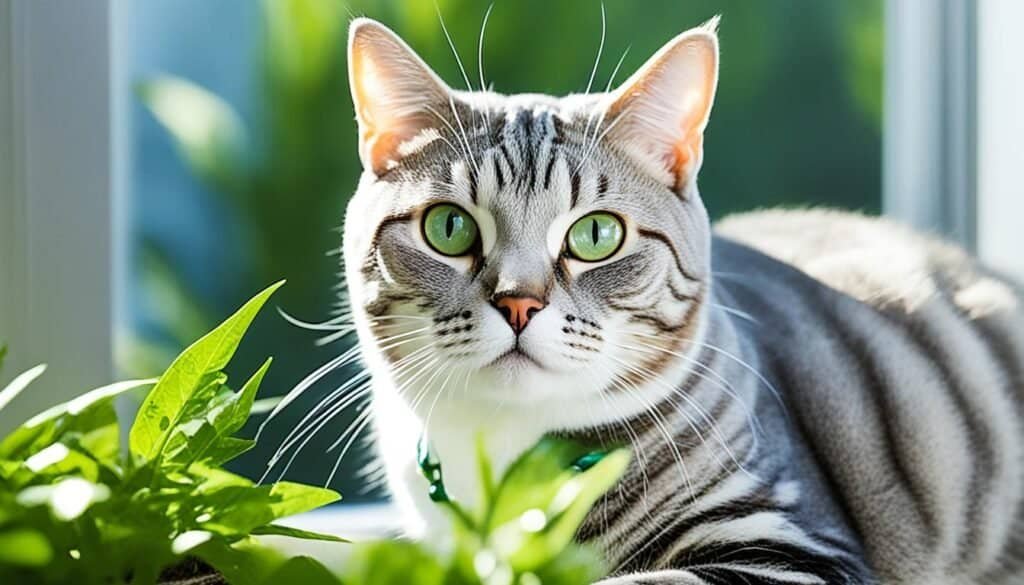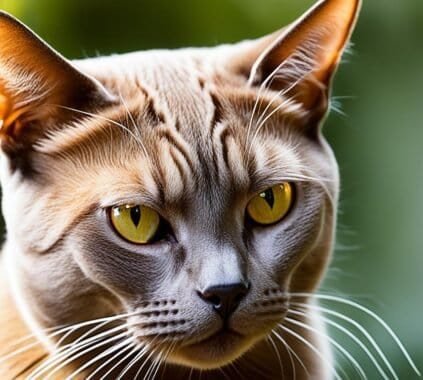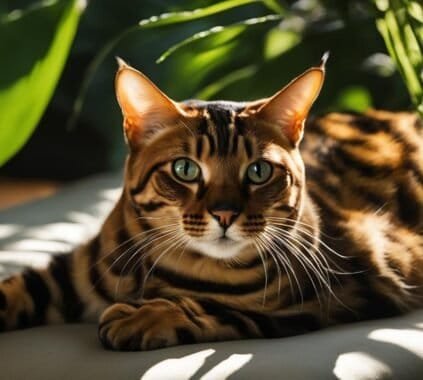The American Shorthair cat is one of the most popular cat breeds in the world. Known for their quiet and gentle nature, they make excellent companions for people of all ages. Whether you live in a small apartment or a spacious house, the American Shorthair can adapt to any environment.
Originally bred by the earliest pioneers in America, these cats have a rich history that adds to their appeal. They were first used as working cats to hunt rats and mice on ships. Over time, they became renowned for their beauty and were recognized as a distinct breed.
When it comes to caring for your American Shorthair cat, there are a few things to keep in mind. Regular exercise is crucial, as these cats can easily become overweight. They also have a strong hunting instinct, so providing them with toys and activities to keep them mentally stimulated is essential.
In addition to their independence, American Shorthair cats are known for their affectionate nature. They love being part of a family and get along well with children and other pets. To ensure their well-being, it is important to provide them with regular veterinary care, a balanced diet, and a loving environment.
Key Takeaways:
- American Shorthair cats are popular due to their quiet and gentle nature.
- They have a strong hunting instinct and require regular exercise to prevent weight gain.
- These cats are affectionate and adaptable, making them great companions for families.
- Regular veterinary care, a balanced diet, and proper grooming are crucial for their well-being.
- Providing a nurturing environment is essential to ensure a happy and fulfilling life for your American Shorthair cat.
History and Origins of the American Shorthair Cat
The American Shorthair cat breed has a rich history that dates back to the early pioneers who came to North America. Originally known as the Domestic Shorthair, these cats were valued for their exceptional hunting skills. They were brought aboard ships to control the rodent population and protect the cargo. Over time, these hardworking cats became an integral part of American society.
The American Shorthair cat’s journey to popularity and recognition as a distinct breed started with their representation in early cat shows. These shows provided a platform to showcase their elegance, beauty, and remarkable temperament. The American Shorthair’s exceptional qualities caught the attention of cat enthusiasts, leading to their recognition by the prestigious Cat Fanciers Association in 1906.
“The American Shorthair cat’s history as diligent mousers and their presence in early cat shows have contributed to their popularity and distinction as a breed loved by many.”
Today, the American Shorthair cat is cherished for their friendly and adaptable nature. They have become beloved pets in households across the country, thanks to their endearing personalities and striking appearance. This breed’s historical background and early representation in cat shows have played a significant role in their journey to becoming one of the most popular cat breeds in America.
The American Shorthair cat’s rich history and unique characteristics make them a breed worth celebrating. Stay tuned for the next section, where we will delve into the essential health considerations for these delightful feline companions.
Health Considerations for American Shorthair Cats
American Shorthair cats are generally healthy, but it is important for pet owners to be aware of certain health concerns that are common in this breed. By understanding these potential issues and taking proactive measures, you can ensure the well-being of your American Shorthair.
Obesity
One common health concern for American Shorthair cats is obesity. These cats have a tendency to gain weight, especially if they lead sedentary lifestyles. Obesity can lead to various health problems, such as arthritis and diabetes. To prevent obesity, it is important to provide regular exercise and monitor their diet. Engaging them in interactive play sessions and offering a balanced, portion-controlled diet can help maintain a healthy weight.
Dental Disease
Dental disease is another health concern for American Shorthair cats. Without proper dental care, they can develop issues such as tooth resorption and periodontal disease. Regular brushing of their teeth, offering dental treats, and scheduling routine dental cleanings with a veterinarian are essential for maintaining their oral health. Good dental hygiene not only improves their overall well-being but also ensures fresh breath.
Vaccine-Preventable Infections
American Shorthair cats are susceptible to vaccine-preventable infections, including panleukopenia, calicivirus, rhinotracheitis, and rabies. Vaccination plays a crucial role in protecting them from these diseases. Regular veterinary check-ups and keeping their vaccinations up-to-date are important for maintaining their overall health and well-being.
Parasitic Infestations
Like all cats, American Shorthairs are vulnerable to various parasites, such as fleas, ticks, ear mites, and intestinal worms. Preventive measures, such as using flea and tick treatments, performing regular fecal exams, and providing preventive medications, are essential for keeping them free from parasites. These measures not only protect your cat from discomfort but also safeguard the health of your family.
By being proactive in addressing these health concerns and working closely with your veterinarian, you can help ensure that your American Shorthair cat stays in optimal health throughout their lives.
| Health Concerns | Preventive Measures |
|---|---|
| Obesity | – Regular exercise – Portion-controlled diet |
| Dental Disease | – Regular teeth brushing – Dental treats – Routine dental cleanings |
| Vaccine-Preventable Infections | – Regular veterinary check-ups – Up-to-date vaccinations |
| Parasitic Infestations | – Use flea and tick treatments – Perform regular fecal exams – Provide preventive medications |
Weight Management for American Shorthair Cats
Weight management is crucial for American Shorthair cats, as they are prone to obesity. Obesity can lead to various health problems, including arthritis and diabetes. Providing them with regular exercise and a balanced diet is key to maintaining their optimal weight and overall health.
Monitoring their food intake is important to prevent weight gain. While free-feeding may work well for most cats, it’s essential to keep an eye on their portion sizes. Engaging them in play and exercises can also help them stay active and burn calories.
Understanding their dietary habits is crucial. Consult with your vet to determine the appropriate daily calorie intake for your American Shorthair cat based on their age, activity level, and body condition. Feeding them a high-quality adult cat diet that is nutritionally balanced is essential for their well-being.
Management Tips for Weight Control:
- Measure their food portions to avoid overfeeding.
- Offer a variety of toys and interactive play sessions to keep them physically active.
- Provide scratching posts and climbing structures to encourage exercise.
- Consider using puzzle feeders to mentally stimulate them during mealtime.
- Avoid using food as a reward; instead, opt for praise and affection.
“Maintaining a healthy weight is essential for the overall well-being and longevity of your American Shorthair cat.” – Dr. Sarah Adams, Veterinarian
Regular monitoring of their weight and body condition is important. If you notice any significant weight gain or loss, consult with your veterinarian for a thorough evaluation and personalized weight management plan for your American Shorthair cat. Together, you can ensure a healthy and happy life for your feline companion.
| Weight Status | Body Condition |
|---|---|
| Underweight | Ribs, spine, and pelvic bones are easily visible. Minimal body fat. |
| Healthy Weight | Ribs can be felt but not prominently visible. A slight layer of fat over the ribs. |
| Overweight | Ribs are difficult to feel. Noticeable fat deposits over the back and abdomen. |
| Obese | No visible or palpable ribs. Excessive fat covering the back, abdomen, and limbs. |
Note: The table represents general guidelines. Consult with your veterinarian for an accurate assessment of your cat’s weight and body condition.
Dental Care for American Shorthair Cats
Dental disease is a common chronic problem in cats, including American Shorthairs. It is crucial to take proper care of your American Shorthair cat’s dental health to prevent issues such as tooth resorption and periodontal disease. By implementing a regular dental care routine, you can ensure their oral health and overall well-being.
Regular Teeth Brushing
Brushing your cat’s teeth regularly is one of the most effective ways to maintain good dental hygiene. Use a cat-specific toothbrush and toothpaste to gently brush their teeth in circular motions. It may take some time for your cat to get used to the process, so be patient and make it a positive experience for them.
Dental Treats
Incorporating dental treats into your American Shorthair’s diet can help promote oral health. These treats are designed to remove plaque and tartar buildup while satisfying your cat’s cravings. Look for treats specifically formulated to support dental health and consult your veterinarian for recommendations.
Routine Dental Cleanings
Regular dental cleanings performed by a veterinarian are essential for preventing dental disease. These cleanings involve a thorough examination of your cat’s teeth and gums, removal of plaque and tartar, and addressing any underlying issues. Schedule routine dental check-ups to ensure early detection and intervention if necessary.
“Maintaining good dental hygiene can help prevent potential health problems and ensure your American Shorthair’s fresh breath and overall well-being.”

Good dental hygiene in American Shorthair cats can prevent potential health problems and ensure fresh breath and overall well-being. By implementing a regular dental care routine that includes teeth brushing, dental treats, and routine dental cleanings, you can help maintain your American Shorthair’s oral health. Always consult with your veterinarian for personalized dental care advice tailored to your cat’s needs.
Vaccine-Preventable Infections for American Shorthair Cats
American Shorthair cats are beloved companions that require proper care to maintain their health and well-being. Like all cats, they are susceptible to bacterial and viral infections. To protect your American Shorthair cat from these diseases, vaccination is highly recommended. Regular veterinary check-ups and keeping their vaccinations up-to-date are crucial for their overall health and well-being.
“Vaccination is the key to preventing vaccine-preventable infections and keeping your American Shorthair cat healthy.”
Common Vaccine-Preventable Infections
There are several vaccine-preventable infections that American Shorthair cats are susceptible to:
- Panleukopenia: A highly contagious viral disease that affects the cat’s gastrointestinal tract and immune system. Vaccination is essential for protection against this potentially fatal infection.
- Calicivirus: A respiratory infection that causes symptoms such as fever, sneezing, and oral ulcers. Vaccination is crucial to prevent the spread of this virus and alleviate its symptoms.
- Rhinotracheitis: Also known as feline herpesvirus, this infection affects the cat’s respiratory system and can cause severe symptoms. Vaccination can help reduce the severity and duration of the disease.
- Rabies: A viral infection that affects the nervous system and is fatal if left untreated. Vaccination against rabies is not only important for your cat’s well-being but also required by law in many areas.
Additional Vaccines to Consider
In addition to the core vaccines mentioned above, there are other vaccines that may be recommended for American Shorthair cats based on the prevalence of certain diseases in your area and your cat’s lifestyle:
- Feline Leukemia Virus (FeLV): This vaccine is recommended for cats that have outdoor access or come into contact with cats of unknown FeLV status. FeLV is a serious and potentially fatal disease that can weaken the cat’s immune system and lead to various health problems.
Vaccination and Preventive Healthcare
Vaccination should be an integral part of your American Shorthair cat’s preventive healthcare routine. Regular veterinary check-ups, which include vaccinations, ensure that your cat’s immune system is equipped to fight off common infections. Your veterinarian will develop a vaccination schedule tailored to your cat’s specific needs, taking into consideration their age, lifestyle, and potential exposure risks.
Parasite Prevention for American Shorthair Cats
American Shorthair cats are beloved companions, but they are also prone to various parasites that can cause discomfort and pose risks to their health. It’s essential to take preventive measures to keep these parasites at bay and ensure the well-being of your American Shorthair cat and your family.
Fleas and Ticks
Fleas and ticks are common parasites that can infest your cat’s fur and skin. Regularly using flea and tick treatments recommended by your veterinarian can help prevent infestations. These treatments typically come in the form of spot-on solutions, collars, or oral medications. Additionally, maintaining a clean living environment by regularly vacuuming your home and washing bedding can help eliminate fleas and ticks.
Ear Mites
Ear mites are microscopic pests that can cause itching, irritation, and inflammation in your cat’s ears. Regularly inspecting your cat’s ears for signs of mites, such as excessive scratching and dark discharge, is important. If you suspect your American Shorthair has ear mites, consult your veterinarian for appropriate medication and cleaning solutions.
Intestinal Worms
Intestinal worms, such as roundworms and tapeworms, can affect your cat’s digestive system and overall health. Regular fecal exams performed by your veterinarian can detect the presence of these worms. Administering preventive medications, such as dewormers, as recommended by your veterinarian can help keep your cat free from intestinal parasites.

By prioritizing parasite prevention, you can ensure that your American Shorthair cat stays healthy and happy. Regularly consult with your veterinarian to develop a comprehensive parasite prevention plan that suits the specific needs of your feline companion.
Spaying or Neutering American Shorthair Cats
Spaying or neutering your American Shorthair cat is a highly recommended procedure that offers numerous benefits for their health and well-being. This surgical intervention helps prevent certain types of cancers, eliminates the risk of unwanted litters, and reduces territorial behaviors.
Aside from these advantages, spaying or neutering your American Shorthair provides an opportunity for other necessary procedures like dental exams and addressing potential health issues. Prior to the surgery, routine blood testing is conducted to identify any underlying problems and ensure a safe procedure. By opting for spaying or neutering, you are not only prioritizing your cat’s health but also playing an important role in managing the cat population.
“Spaying or neutering your American Shorthair cat helps prevent certain types of cancers, eliminates the risk of unwanted litters, and reduces territorial behaviors.”
Conclusion
American Shorthair cats are cherished companions known for their gentle and playful nature. As popular family pets, they easily get along with children and other animals, making them a delightful addition to any household. To ensure their well-being, it is crucial to provide them with proper care, which includes attentive weight management, regular dental care, preventive healthcare measures, and routine veterinary check-ups.
By maintaining a healthy weight through exercise and a balanced diet, you can help prevent obesity and related health issues in your American Shorthair cat. Regular dental care, such as brushing their teeth and scheduling dental cleanings with a veterinarian, will contribute to their oral health and overall well-being.
Additionally, keeping up with their preventive healthcare, including vaccinations and parasite prevention, is vital for safeguarding their health and protecting them from common infections and parasites. Finally, showing them love, attention, and a nurturing environment will ensure that your American Shorthair cat thrives and leads a happy and fulfilled life in your care.
Remember, each American Shorthair cat is unique and may have specific needs. It is always recommended to consult with a veterinarian who can provide tailored guidance and advice based on your cat’s individual requirements. With responsible care and affection, your American Shorthair cat will bring joy and companionship to your family for many years to come.
FAQ
What is the history and origin of the American Shorthair Cat?
What are the common health concerns for American Shorthair Cats?
How should I manage the weight of my American Shorthair Cat?
What dental care should I provide for my American Shorthair Cat?
Which vaccine-preventable infections should I be aware of for my American Shorthair Cat?
How can I prevent parasites in my American Shorthair Cat?
Should I spay or neuter my American Shorthair Cat?
Last modified: February 20, 2024














[…] are some tips for preventing cat anxiety in newly adopted […]
[…] prevent accidents and keep your home clean. In this article, we will provide easy steps and expert tips for successful cat litter training, along with recommendations for the best cat litter options in the […]
[…] some other cat breeds, Scottish Folds are not excessively vocal. They tend to communicate through gentle gestures and […]